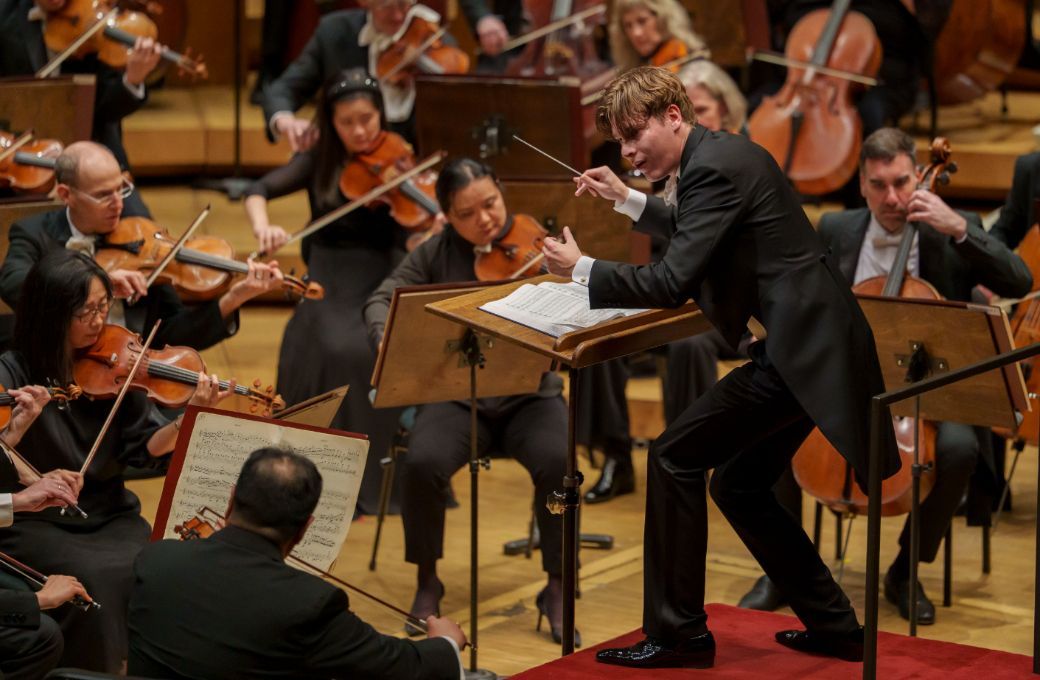The Chicago Symphony Orchestra and its Music Director Designate, Klaus Mäkelä, rode a wave of successes this past weekend, with an enthusiastic audience eager to see its home orchestra under the baton of its future leader. It was the second of his two weeks in town, a longer stay than most guest conductors but not enough for the music lovers looking impatiently to the ten in-town weeks per season that begin in fall 2027.
The program opened with its longest piece, Brahms’ Second Piano Concerto with Daniil Trifonov. The current CSO artist-in-residence, Trifonov first appeared with the orchestra more than 12 years ago, making him an old hand here in comparison with his conductor. The two displayed an impressive partnership, Mäkelä balancing the sound expertly around the piano and Trifonov intelligently imitating and responding to gestures from the orchestra. In a question-and-answer passage early in the first movement, Trifonov’s response to a phrase from the woodwinds mimicked their articulations, and in the second, a quick neighbor-note figure tennis-bounced between the orchestra and the piano. Mäkelä managed dynamics and tempos with exactitude, keeping impeccable ensemble at the ends of phrases and always situating the piano in the sound deliberately.
The third movement, one of the loveliest moments in the oeuvre of a composer who excelled at loveliness, was exceptional this evening. John Sharp’s cello solo – as conducted by a cellist – sang with sensitivity and yearning, and Trifonov’s interpretation, pulling out a pinging melody that guided the harmonies by the hand, flew gracefully. Succumbing to the rousing crescendo at the end of the first movement, the audience applauded, setting a precedent for each of the concerto’s four movements. Mäkelä chose to soak in it rather than hush it or dive into the next movement, letting the music lovers show their love.
The second half of the concert began with Initiale for brass septet, a very 20th-century take on fanfare by Pierre Boulez. Mäkelä used a crisp beat pattern with clear shapes for the mercurial meter, and helpfully started the applause for the audience, who weren’t 100% sure when it was over.
Dvořák's Symphony no. 7 in D minor was the finale. Mäkelä brought an extra helping of podium energy, swaying, stooping and sweeping through the four movements. Beginning with a rigorously articulated cello line – again with the cello expertise – he manifested a vision for the symphony’s drama, attending to counter-melodies, punctuating phrases and massing the sound for a final swell and amen.

During the final applause, Mäkelä seemed almost giddy with the success. Before turning to acknowledge the audience, he grabbed his tux lapels for one confident shake, and then gratefully, genuinely, flitted around the orchestra to recognize soloists, ending by shaking not just the concertmaster’s hand, but that of every front-desk string player.
Throughout the concert, he was visibly having a good time. He had a big smile on his face right from the downbeat of the Brahms, and the energy and fired-up demeanor rubbed off onto the players and audience. In classical music, where a fragrance of the sacrosanct never totally dissipates, Mäkelä’s enjoyment is a welcome sight.


